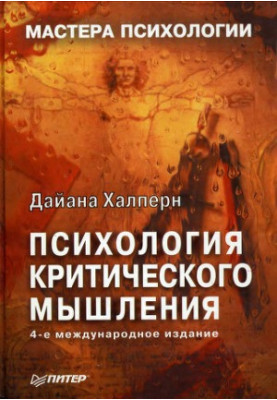Psychology of Critical Thinking
 Instant download
Instant download
after payment (24/7)
 Wide range of formats
Wide range of formats
(for all gadgets)
 Full book
Full book
(including for Apple and Android)
This book is written to help those who want to learn how to think modernly. Drawing on the latest achievements of cognitive psychology and its unique pedagogical experience Diane Halpern has developed an effective program of training in the skills of “critical thinking” This book can be widely used in teaching and methodological work. It will be a great help in self-education. CM In addition, it is a kind of guide to modern cognitive psychology .. Recommended for psychologists, educators, philosophers, as well as anyone interested in cognitive psychology, creativity psychology, decision theory. Once at a meeting of the department, one of the leading professors of the Faculty of Psychology of St. Petersburg State University was literally shocked. When I found out , that one of the graduate students is not only convinced, The Sun revolves around the Earth , but, More about , I have no idea about Galileo.... not about Copernicus . However, the professor’s astonishment would not have been as strong if he had known that approximately 21% of American adults agree with our student hero. Since most of these people had secondary and higher education, the question arises: why they were scientifically illiterate, despite the fact that the necessary information and facts they, of course, repeatedly reported. The answer to this question, as well as to the questions: “What happens when we think and think productively and creatively? What is the difference between “good” thinking (critical, according to D. terminology) Halpern) from "bad"? How to improve thinking? Is it possible to form critical thinking skills? What are the ways of developing adequate knowledge and knowledge structures?" - contains the book now offered to the domestic reader by Diana Halpern "Psychology of critical thinking" , In recent years, several publications have been published in the United States,. which in itself testifies to its popularity and undoubted practical benefit. When searching for answers to these questions, Diane Halpern draws on the rich theoretical and factual material accumulated by cognitive psychology in the study of cognitive processes, in particular the process of thinking. Of course, much remains to be revealed here, and it is unlikely that it will ever be revealed to the end. But what has been studied over the past 25 years has given the author the opportunity to offer specific techniques that contribute to the directional formation of critical thinking and knowledge structures.
LF/614664/R
Data sheet
- Name of the Author
- Дайана Халперн
- Language
- Russian
- Release date
- 2000



